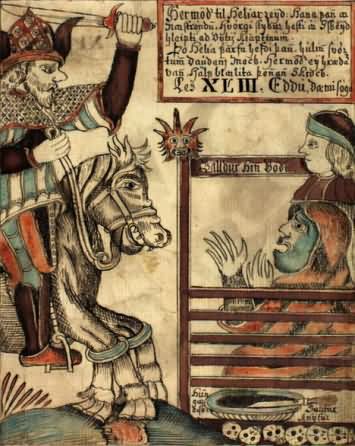
Myths of Northern Lands
By H. A. Guerber
CHAPTER XIV
HERMOD
The Nimble God
Another of Odin's sons, and his special attendant, was Hermod, a bright and beautiful young god, who was gifted with such great rapidity of motion that he was always designated as the swift or nimble god.
"But there was one, the first of all the gods
For speed, and Hermod was his name in Heaven;
Most fleet he was."
BALDER DEAD (Matthew Arnold)
As Hermod was so remarkably quick the gods usually employed him as their messenger, and at a mere sign from Odin he was always ready to speed to any part of the world. As a special mark of favor, the king of gods gave him a magnificent corselet and helmet, which he often donned when he took part in war, and sometimes Odin intrusted to his care the precious spear Gungnir, bidding him cast it over the heads of combatants about to engage in battle, and thus kindle their ardor into murderous fury.
"Let us Odin pray
Into our minds to enter;
He gives and grants
Gold to the deserving.
He gave to Hermod
A helm and corselet."
SÆMUND'S EDDA (Thorpe's tr.)
As Hermod delighted in battle, he was often called "the valiant in combat," and confounded with the god of the universe, Irmin; he sometimes accompanied the Valkyrs on their ride to earth, and frequently escorted the warriors to Valhalla, whence he was considered the leader of the heroic dead.
"To him spake Hermoder and Brage:
'We meet thee and greet thee from all,
To the gods thou art known by thy valor,
And they bid thee a guest to their hall.'"
OWEN MEREDITH

Hermod rides to Hel on Sleipnir. He meets Hel and Balder. From the 18th century Icelandic manuscript "NKS 1867 4to", now in the care of the Danish Royal Library.
Hermod's distinctive attribute, besides his corselet and helmet, was a wand or staff called Gambantein, the emblem of his office, which he carried with him wherever he went.
Hermod and the Soothsayer
Once, oppressed by nameless fears for the future, Odin, seeing that the Norns would not answer his questions, bade Hermod don his armor, saddle Sleipnir, which he alone was allowed to ride, and hasten off to the land of the Finns. This people, living in the frozen regions of the pole, were supposed to have great occult powers, and to be able to call up the cold storms which swept down from the North, bringing plenty of ice and snow in their train.
The most noted among all these conjuring Finns was Rossthiof (the horse thief), who was wont to entice travelers into his realm by magic arts, only to rob and slay them; but although he could predict the future, he was always very reluctant indeed to do so.
Hermod, "the swift," had no sooner received Allfather's directions than he started out, riding rapidly northward, and brandishing, instead of his own wand, Odin's runic staff, which had the power of dispelling all the obstacles that Rossthiof conjured up to hinder his advance. In spite, therefore, of phantom-like monsters and of invisible snares and pitfalls, Hermod safely reached the conjurer's abode, and when the giant began to attack him, soon mastered him, bound him hand and foot, and declared he would set him free only if he promised to reveal all that he wished to know.
Rossthiof, seeing there was no hope of escape, pledged himself to do all the god wished, and as soon as he was free began to mutter terrible incantations, at the mere sound of which the sun hid behind the clouds, the earth trembled and quivered, and the storm winds howled like a pack of hungry wolves.
Pointing to the horizon, the conjurer now bade Hermod look, and the swift god saw a great stream of blood redden all the ground. While he was gazing wonderingly at this stream, a beautiful woman suddenly appeared, and a moment later a little boy stood beside her. To the god's amazement, this child grew with such marvelous rapidity that he soon attained his full growth, and then only did Hermod notice that he fiercely brandished a bow and arrows.
As Hermod was gazing fixedly upon this vision, Rossthiof began to speak, and declared that the stream of blood portended the murder of one of Odin's sons, but that if the father of the gods wooed and won Rinda, in the land of the Ruthenes (Russia), she would bear him a son who would attain his full growth in a few hours and would soon avenge his brother's death.
"Rind a son shall bear,
In the western halls
He shall slay Odin's son,
When one night old."
SÆMUND'S EDDA. (Thorpe's tr.)
Satisfied with this prophecy, Hermod returned to Asgard, where he reported all he had seen and heard to Odin. The father of the gods thus definitely ascertained that he was doomed to lose a son by a violent death. He soon consoled himself, however, by the thought that another of his descendants would avenge the murder and thereby obtain all the satisfaction which a true Northerner ever required.